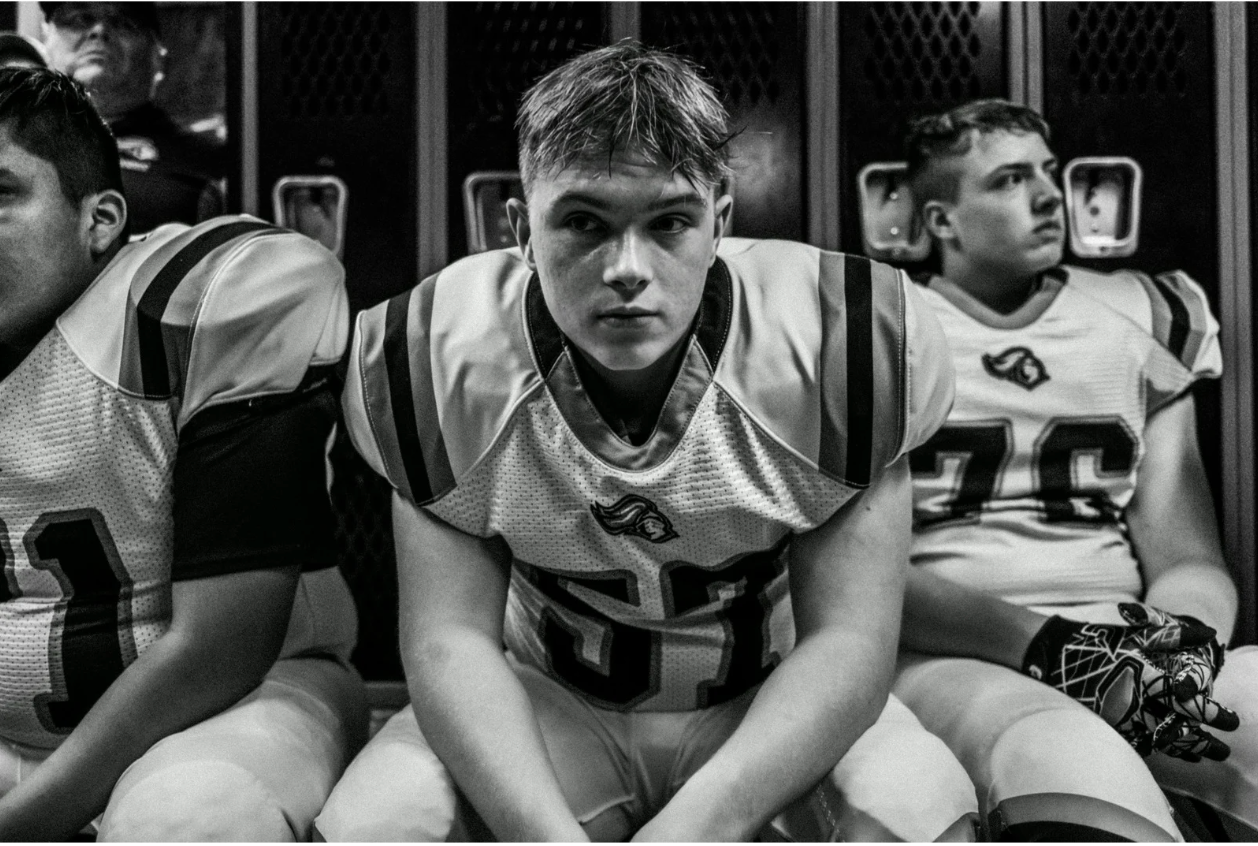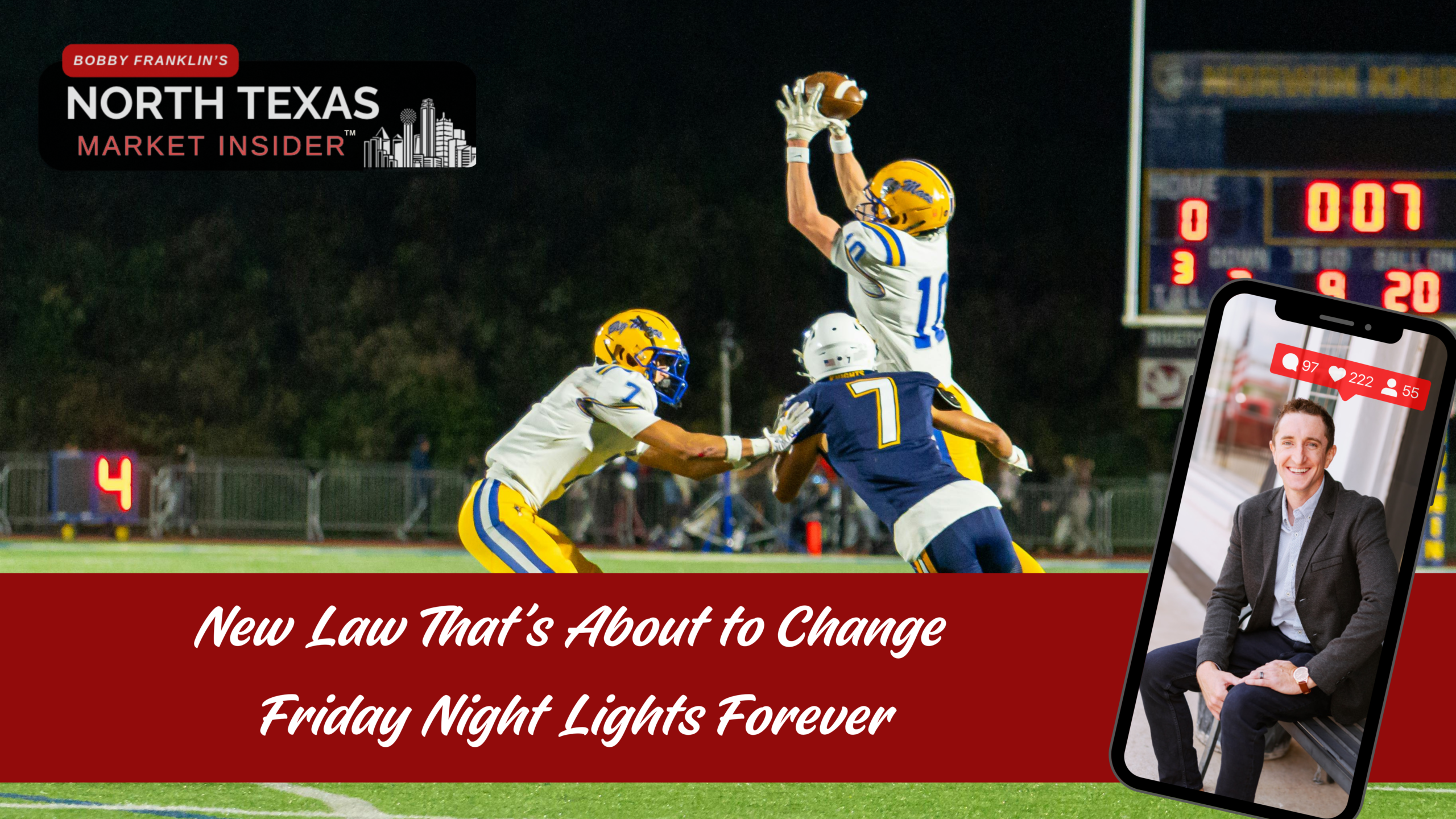Listen, here’s what most agents won’t tell you about choosing a community in North Texas: The way a school handles Friday night football isn’t just entertainment, it’s a direct indicator of property values, community culture, and whether you’re buying into a neighborhood that’s trending up or slowly circling the drain.
And Texas just changed the game completely.
Starting this school year, game officials can eject you from your kid’s sporting event without warning. No second chances. No appeals. One mistake, and you’re watching the rest of the season from your car in the parking lot, if you’re lucky. [1]
But here’s where this gets interesting from a real estate perspective: The schools that handle this law well are the ones you want to buy into. The ones that don’t? They’re about to reveal themselves in ways that will impact your home’s value for years to come.
Let me break down what’s really happening here, and why smart buyers are paying attention.
The Law That’s Separating Elite Communities from Everyone Else

Texas Senate Bill 2929, effective September 1, 2025, just handed referees and officials the nuclear option: immediate ejection authority for disruptive spectators at UIL athletic events, no warning required.
Think about that for a second. Previously, officials had to give you a verbal warning first. Now? You’re out on the spot if they determine your behavior crosses the line. [2]
Why this matters to your real estate decision: This law is about to expose which communities have their act together and which ones have been skating by on reputation alone. The chaos is the opportunity here, and I’m about to show you how to leverage it.
The Behaviors That’ll Get You Kicked Out (And What They Reveal About Your Community)
Here’s what can get you ejected: verbal abuse toward officials, players, or coaches; inappropriate language; taunting; fighting or threatening behavior; intoxication; harassment; or interfering with the game. [3]
That’s a pretty wide net, intentionally so.
The Franklin perspective: This ambiguity? It’s fantastic. It forces school administrators to show their hand on how they lead. Do they communicate expectations clearly? Do they enforce consistently? Do they protect the experience for families who want a positive environment?
Communities that excel here will see:
- Higher property values (families pay premium for positive school culture)
- Stronger administrative leadership (extends beyond athletics into academics)
- Better long-term investment potential
- Lower turnover rates in the neighborhood
Communities that struggle will experience:
- Reputation damage that impacts desirability
- Declining enrollment as families choose alternatives
- Stagnant or declining property values
- Increased turnover and instability
The Three-Strike Rule That Could Tank a School’s Home Field Advantage

Here’s where this gets nuclear for schools: If three ejection incidents occur at a single school in one academic year, that school risks losing the ability to host home officials for future games. [4]
Think about what that means:
- Game scheduling chaos
- Lost revenue from home attendance
- Demolished team morale and home-field advantage
- Community embarrassment that spreads fast on social media
From a real estate intelligence perspective: This is a leading indicator. Schools hitting that three-strike threshold are communities where administrative control is slipping. That’s your signal to either avoid or, if you’re strategic, wait for the inevitable price correction when reputation damage hits property values.
Why This Law Exists: The Numbers That Should Concern Every North Texas Buyer
UIL officials reported a 100% increase in athlete ejections and a 40-50% rise in ejections of coaches and fans over the five-year period leading to this law’s passage. [5]
Let that sink in. A 100% increase. That’s not a trend, that’s a cultural breakdown.
Officials are experiencing verbal abuse, threats, and hostile environments so severe that many are quitting entirely, contributing to a significant referee shortage across Texas.
The smart buyer’s question: “Which North Texas communities have this problem, and which ones don’t?”
Because here’s what I know after years in this market: The schools with positive sports cultures aren’t accidents, they’re the result of strong leadership, engaged communities, and families who understand what really matters. Those are the neighborhoods where your home appreciates.
What Elite North Texas Communities Are Doing Right Now
Communities like Frisco, Plano, Allen, and McKinney have built reputations around excellence in both academics and athletics, with strict enforcement of spectator conduct policies that maintain family-friendly environments. [6]
These districts didn’t wait for the law to act, they’ve been proactive:
Pre-season parent meetings explaining expectations
Digital communications through multiple channels
Clear signage at venues
Administrator training on enforcement protocols
Law enforcement partnerships for high-profile games
Translation for buyers: These are communities with their operational infrastructure dialed in. That organizational excellence extends beyond Friday nights, it impacts everything from school board decisions to bond referendums to long-term planning.
The Real Estate Questions You Need to Ask About Any North Texas Community

When I’m working with relocating families or local move-up buyers, here are the questions that separate serious buyers from tourists:
About the school’s athletic program:
- “What’s your track record with spectator conduct incidents?”
- “How do you communicate behavioral expectations to parents?”
- “What security measures are in place at sporting events?”
- “Tell me about your sportsmanship initiatives.”
About the community culture:
- “How does the community respond when problems arise?”
- “What’s the administrative team’s reputation for transparency?”
- “How do property values trend compared to similar communities?”
The Franklin move here: Don’t just accept marketing fluff. Dig into actual incidents, parent reviews, and whether the school has hit any of those warning thresholds. This intel gives you negotiating leverage and helps you avoid costly mistakes.
The Property Value Connection You’re Not Considering
Here’s what most agents won’t tell you because they’re focused on the transaction, not your long-term wealth building:
Schools with positive athletic cultures and strong sportsmanship enforcement typically indicate:
✅ Strong administrative leadership (impacts everything from academic performance to facility maintenance)
✅ Active, engaged community (higher volunteerism, better-maintained neighborhoods, stronger HOAs)
✅ Positive school culture that extends to academics (families choosing these schools are typically more invested in education)
✅ Higher and more stable property values (desirability premium that persists through market cycles)
Schools struggling with spectator behavior often reveal:
❌ Weak administrative control (reactive rather than proactive leadership)
❌ Declining community engagement (apathy that spreads to other aspects of neighborhood life)
❌ Cultural issues that extend beyond athletics (often correlates with academic performance concerns)
❌ Property value vulnerability (reputation damage that impacts resale potential)
How to Support Your Student-Athlete Without Getting Ejected (And Why It Matters)

Look, I get it, you’re passionate about your kid’s success. That’s what makes Texas high school sports special. But here’s the thing: Your behavior in those stands is teaching your children more about character than any touchdown or home run ever will.
DO THIS:
- Cheer positively for your team and acknowledge good plays by both sides
- Respect officials’ decisions (even when they’re objectively wrong…. because they will be)
- Treat visiting teams like guests in your community
- Use this as teaching moments for younger children about grace under pressure
- Report concerning behavior through proper channels
NEVER DO THIS:
- Argue with officials during or after games (you won’t win, and you’ll look foolish)
- Engage in taunting or negative chants (reflects poorly on your community)
- Use profanity or inappropriate language (your kid’s watching, and so are college scouts)
- Coach from the stands (trust me, your kid hates this more than you know)
- Consume alcohol before events (illegal on school property anyway)
The real lesson: Communities where parents model appropriate behavior are communities where home values appreciate. It’s that simple. Buyers with options choose neighborhoods where the adults act like adults.
What Happens If You Get Ejected: The Legal Reality
Here’s where this gets serious: Once an official requests your removal under Senate Bill 2929, that decision is final. No appeals process. No negotiation. No do-overs.
Resisting removal can result in:
- Trespassing charges (now you have a criminal record)
- Additional district disciplinary action
- Potential impact on your student’s athletic eligibility (yes, really)
- Permanent banning from future athletic events
Schools typically have progressive suspension periods: 30 days for first offense, calendar year for repeat offenses, permanent ban for serious incidents.
The Franklin take: Don’t be the parent who becomes the cautionary tale in the group text. Your ego isn’t worth your kid’s embarrassment or your family’s reputation in the community.
The Bigger Picture: What This Law Reveals About Texas Communities in 2025

One of Senate Bill 2929’s primary goals is addressing the critical shortage of sports officials across Texas by creating safer working environments that encourage participation.
Translation: The state recognized that without officials, there are no games. Without games, there’s no Friday Night Lights culture that makes Texas communities special. This law is existential for maintaining what makes Texas high school athletics unique.
For real estate decisions, this means:
Communities that embrace the spirit of this law will see:
- Improved recruitment and retention of quality officials (better games, better experience)
- Enhanced reputation for athletic programs (attracts quality coaches and players)
- Stronger community unity around shared values (the “we’re all in this together” factor)
- Better preparation of young people for adult responsibilities (character building that extends beyond sports)
- Increased property values associated with desirable school districts (the factor that matters most)
Communities that resist or struggle with implementation will experience:
- Difficulty hosting quality games (officials avoid hostile environments)
- Reputation damage in regional and statewide circles (spreads fast on social media)
- Declining enrollment as families choose alternatives (death spiral for property values)
- Property value stagnation or decline (the market reflects community culture)
The Strategic Play for Smart North Texas Buyers
Here’s how to leverage this law for your real estate decisions:
Immediate actions:
- Research school incident reports for communities you’re considering
- Attend a sporting event before making an offer (see the culture firsthand)
- Talk to parents already in the district (ask direct questions about atmosphere)
- Review social media for community reactions to enforcement (reveals true culture)
- Check property value trends against comparable districts (correlation is real)
The “five steps ahead” strategy:
Short-term (Next 6 months): Schools with existing behavior problems will hit the three-strike threshold, revealing which communities have cultural issues.
Medium-term (6-18 months): Reputation damage from enforcement problems will start impacting property values in affected districts, creating buying opportunities for value investors or warnings for premium buyers.
Long-term (2-5 years): Clear separation between elite communities (strong enforcement, positive culture) and struggling districts (repeated violations, declining reputation) will solidify in the market.
Resources for Serious North Texas Buyers
For district research:
- University Interscholastic League (uiltexas.org) – official rules and incident reporting
- Local school district websites – specific policies and enforcement records
- “The Texas Way” Initiative – sportsmanship education resources
- District athletic department contacts – direct source for behavioral incident history
For real-time intelligence:
- School social media monitoring (parent groups reveal real issues)
- Local news coverage of athletic events (media reports serious incidents)
- Community Facebook groups (unfiltered parent perspectives)
- Real estate agent intel networks (we know which schools have problems)
The Bottom Line: This Law Is Revealing Community Character in Real-Time

Look, most real estate agents will show you the pretty houses, the nice schools, the updated amenities. That’s their job, move product, close deals, move on.
But that’s not how we build wealth through real estate.
Senate Bill 2929 is doing something fascinating: it’s forcing Texas communities to reveal their true character under pressure. The way school districts, parents, and community leaders respond to this law tells you everything you need to know about whether you’re buying into a neighborhood that’s trending up or slowly declining.
The communities that excel, strong enforcement, clear communication, positive culture—those are the ones where your home appreciates and your family thrives.
The communities that struggle, repeated violations, administrative chaos, cultural breakdown—those are the ones where you’ll regret the purchase in three years when you’re trying to sell into a declining market.
This is chaos creating opportunity, exactly the kind of market disruption that separates smart buyers from everyone else.
if you’re interested in moving to North Texas and see what the Friday night lights experience is all about, check out my Relocation to Texas guide: (just click on the image below)

📊 Your North Texas market intel source
🎯 Text 214-228-0003 for insider updates
Bobby Franklin – REALTOR®
Legacy Realty Group – Leslie Majors Team
Serving Ellis County & DFW
STRATEGIC INTEL NOTE: This law is a gift for agents who know how to position it. While other agents ignore the cultural indicators, we’re using this as a qualifying tool, helping serious buyers identify elite communities while avoiding potential problem areas. That’s the Ellison approach: extract value from disruption while everyone else scrambles to react.
The market is always revealing truth to those paying attention. Are you watching?





